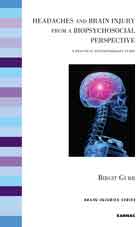Headaches and Brain Injury from a Biopsychosocial Perspective: A Practical Psychotherapy Guide

Book Details
- Publisher : Routledge
- Published : 2014
- Cover : Paperback
- Pages : 384
- Category :
Neuroscience - Category 2 :
Trauma and Violence - Catalogue No : 35046
- ISBN 13 : 9781782201014
- ISBN 10 : 1782201017
Reviews and Endorsements
‘An excellent and concise overview of post-traumatic headache with comprehensible hands-on practical treatment recommendations derived from decades of clinical experience.’
— Mark Obermann, MD, Consultant Neurologist, Senior Scientist, Department of Neurology, University Hospital Essen, University of Duisburg-Essen, Germany
‘This elegantly written book offers stimulating reading for scientists and therapists alike with valuable insights into the management of this complex condition. Dr Gurr’s knowledge and expertise shine through each section as she shares the fruits of her long experience. The freshness of her approach and user-friendly style bring this challenging subject to life.’
— Meherzin Das, Consultant Clinical Psychologist, Clinical Lead Dorset Community Pain Service; Visiting Fellow, Bournemouth University, UK
‘If clinicians who work from within a multi-disciplinary psychological framework to help patients with post-injury headaches could have only one book on their bookshelf, this is it. Dr Gurr has managed to produce a wonderfully readable, richly illustrated, and very “hands on” practitioner resource. One of the major strengths of the book is that it concludes with a considerable number of practical resources provided as appendices to further inform and guide everyday clinical practice. This book is extremely well-integrated as a result of more than a decade’s tireless personal dedication by the author to research and everyday clinical practice in this important area of brain injury rehabilitation. A definite “must-have” for those who work in the field of post-brain injury psychological management and rehabilitation of headaches.’
— Rudi Coetzer, Consultant Neuropsychologist and Head of Service, North Wales Brain Injury Service, Betsi Cadwaladr University Health Board NHS Wales, UK
‘This book is an important contribution and a groundstone for psychological treatment of patients with post-traumatic headache. Post-traumatic headache is a stepchild in modern headache research and very little is actually known about underlying mechanisms and proper evidence for the present treatment strategies is lacking. With this book, Dr Gurr aims to cover the entire range of definitions, proposed mechanisms, theories, treatment strategies, and outcome instruments. It is a very ambitious project but has resulted in a comprehensive and detailed book. I sincerely hope that this impressive work will inspire the clinical community to accept and invest scientific resources into this costly complex of post-traumatic headache.’
— Rigmor Højland Jensen, Professor, Dr Med Sci, Danish Headache Center, Department of Neurology, Glostrup Hospital, University of Copenhagen, Denmark
‘The special highlights of this book – the numerous working materials for diagnostic assessment and therapeutic work – give clinicians the chance to put its theoretical content immediately into practice.’
— Maria Kleinstäuber, PhD, Assistant Professor of Clinical Psychology, Department of Clinical Psychology and Psychotherapy, Philipps-University Marburg, Germany
‘This is a rare and valuable book. It brings to a much neglected topic years of clinical experience as a neuropsychology colleague in an NHS service. Critical concepts and techniques that focus on separating the symptom of headache away from its associated fears are illustrated by vivid clinical vignettes and well-described protocols. This book will be of immense value to therapists treating patients following minor head injury and other headache disorders. It also opens up to physicians and other non-psychologists the sort of dilemmas and problems of the mind that so often pass unrecognised in clinic. It shows how these affect brain function and gives doctors and therapists alike the tools to explain to patients what is going on.’
— Dr J. P. S. Burn, Consultant in Rehabilitation & Brain Injury, Poole Hospital, Dorset, UK
Read a review of this title in 'The International Journal of Psychoanalysis'

